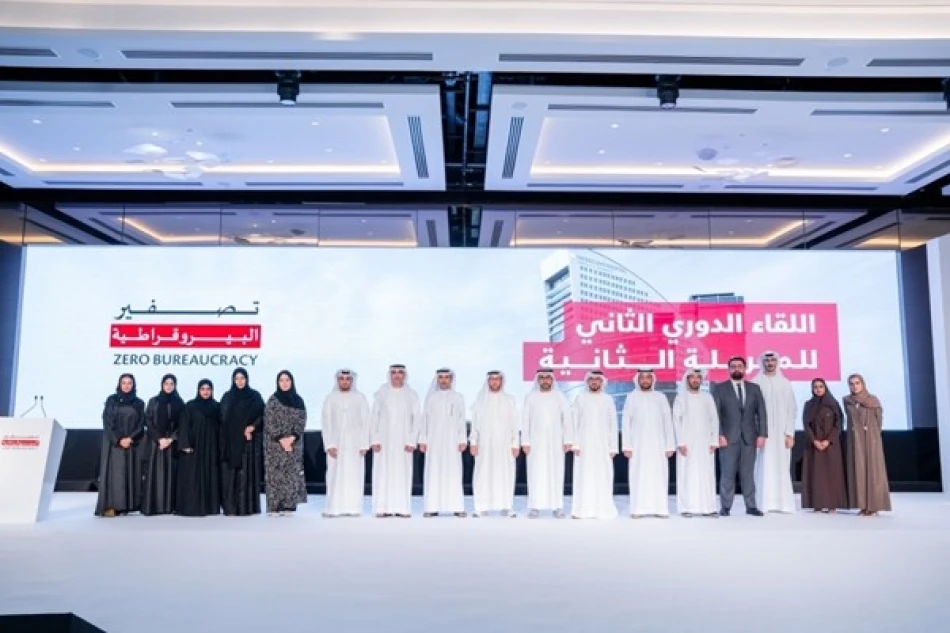
Ajman Chamber Launches 'One-Step Startup' Initiative to Streamline Business Setup
UAE Slashes Export Red Tape by Half in Bold Push to Boost Industrial Competitiveness
The UAE is dramatically streamlining its export bureaucracy, cutting procedures by 50% and reducing required documents from 27 to just 8 as part of an ambitious new initiative that could reshape the country's industrial export landscape. The "Export in One Step" program, launched by Ajman Chamber of Commerce, represents the most aggressive bureaucracy-cutting effort yet in the Emirates' drive to boost non-oil exports and compete with regional trade hubs like Singapore and Hong Kong.
Bureaucracy Elimination Goes Digital
The initiative, unveiled during the "Second Zero Bureaucracy Meeting" in Dubai, consolidates 10 government services into a single digital platform. What previously required 38 separate procedures and five working days can now be completed with 19 steps in just two days—with some services available instantly.
Abdullah bin Mohammed Al Muwaiji, Chairman of Ajman Chamber's Board of Directors, announced the program alongside senior officials including the Ministers of Economy and Tourism, and Foreign Trade. The timing aligns with the UAE's broader "We the UAE 2031" vision and the ambitious "AED 300 Billion Project" aimed at doubling the industrial sector's GDP contribution.
From Paper Trail to Digital Highway
The transformation is striking in its scope. Exporters previously navigated a maze of 27 different documents across multiple government agencies. The new system requires only 8 documents, processed through integrated federal and local platforms. This represents more than administrative convenience—it's a fundamental restructuring of how the UAE approaches trade facilitation.
Strategic Timing Amid Global Trade Shifts
The initiative comes as global supply chains continue reshaping post-pandemic, with companies seeking more efficient trade corridors. The UAE is positioning itself aggressively against established trade hubs, leveraging its growing network of Comprehensive Economic Partnership Agreements (CEPAs) with major economies.
This bureaucracy-slashing approach mirrors successful strategies employed by Singapore and Estonia, where digital-first government services have become competitive advantages. However, the UAE's version is more ambitious in scope, targeting specific industrial export bottlenecks rather than general government digitization.
Industrial Sector Gets Priority Treatment
The focus on industrial exports is particularly strategic. The UAE's manufacturing sector has been expanding rapidly, with the government targeting significant increases in industrial GDP contribution. By removing administrative friction, the initiative directly supports the "300 Billion Project's" goal of enhancing industrial competitiveness.
Market Implications and Investor Interest
For businesses and investors, this represents a tangible improvement in operational efficiency. Reduced processing times and simplified procedures lower the cost of doing business—a critical factor for manufacturers operating on thin margins in competitive global markets.
The initiative also signals the UAE's commitment to maintaining its edge over regional competitors like Saudi Arabia's emerging industrial cities and Qatar's logistics ambitions. By making exports faster and cheaper to process, the UAE strengthens its value proposition for international manufacturers considering Middle Eastern operations.
Phase One Success Could Trigger Broader Reforms
The current phase involves 10 government partners, but the modular approach suggests rapid expansion is possible. If successful, this model could extend to other business processes, potentially transforming the UAE's entire regulatory environment. The emphasis on "next-generation services" indicates this is just the beginning of a broader digital transformation.
Regional Competition Intensifies
This move comes as Gulf states increasingly compete for the same pool of international businesses and investment. Saudi Arabia's Vision 2030 includes similar bureaucracy reduction goals, while Qatar and Oman are also streamlining business processes. The UAE's advantage lies in its execution speed and integration across multiple government levels.
The success of this initiative could influence how other Gulf states approach administrative reform, potentially triggering a regional race toward greater efficiency. For global businesses, this competition ultimately benefits operational costs and market access across the entire Gulf region.
Most Viewed News

 Layla Al Mansoori
Layla Al Mansoori






